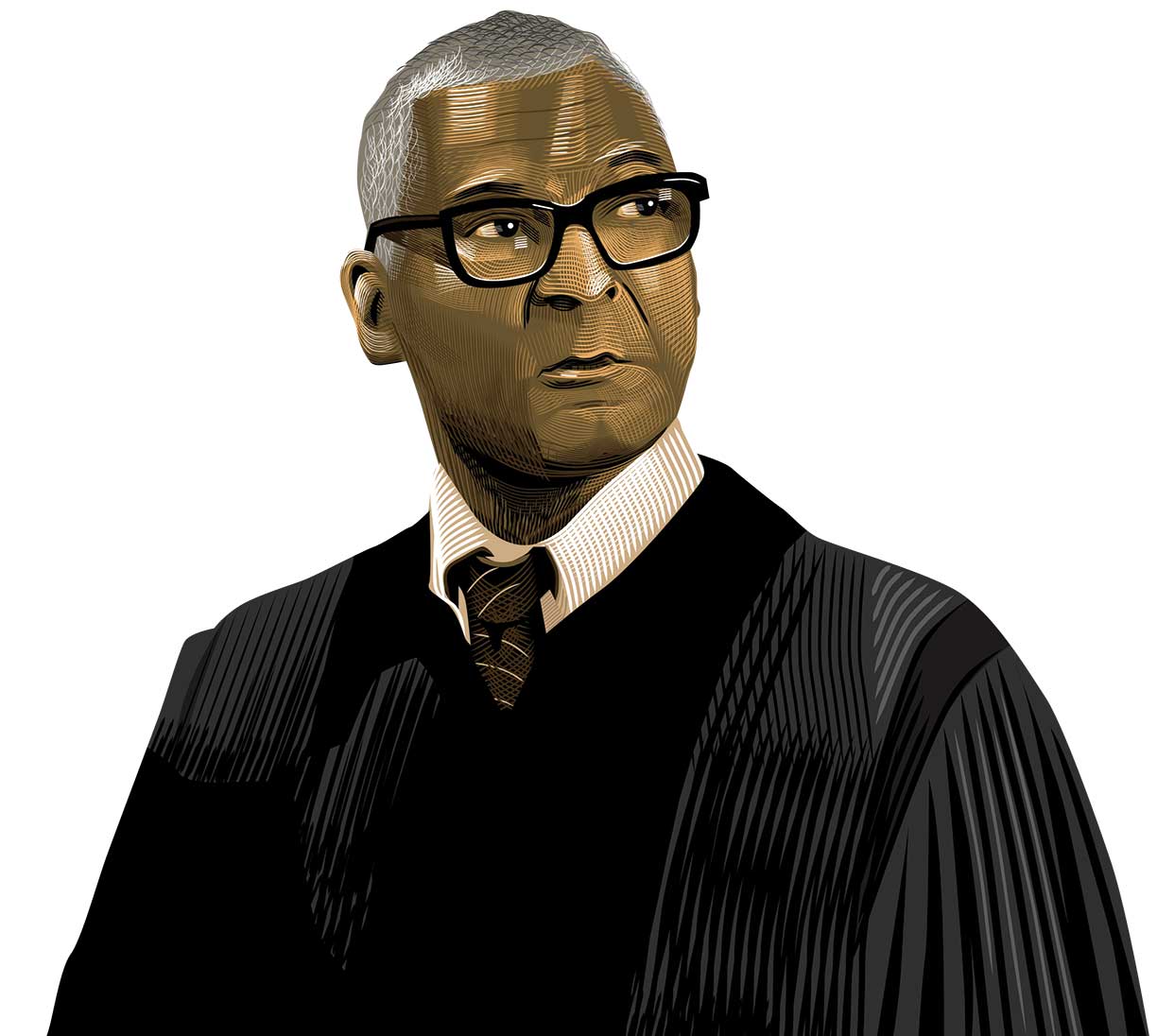Princeton Portrait: He Became a ‘Folk Hero’ After Being Shunned
Bruce McMarion Wright h’01 (1917-2005)
In 1998, when a reporter from The New York Times, at work on a profile of the famous judge, poet, and civil rights champion Bruce Wright, had lunch in New York with Wright and the publisher Lyle Stuart, Stuart told her, “You should walk through the streets of Harlem with this guy. He’s a folk hero.”
Wright grew up in Princeton and New York City, attending the prestigious Townsend Harris High School. In 1939, Princeton University admitted him with a full scholarship without knowing he was Black. When Wright duly arrived at McCosh Hall in September to register for classes, a functionary pulled him out of line and took him to the admissions office, where the dean of admissions, Radcliffe Heermance *1909, told him, “If you’re trying to come here, you’re going someplace where you’re not wanted.” Wright ended the day sitting on his luggage beside the road, watching for his father’s car to drive up and take him home.
“Princeton University does not discriminate against any race, color, or creed,” the dean wrote in a follow-up letter to the young man. “There are no colored students in the university and a member of your race might feel very much alone … . My personal experience would enforce my advice to any colored student that he would be happier in an environment of others of his own race.”
Wright attended Lincoln University and New York Law School, pausing between them to fight with the 26th Infantry Regiment in World War II, where he won four medals for valor and participated in the Normandy landings. In the 1950s, he became the lawyer of the jazz drummer Art Blakey; throughout the late age of jazz, he was immersed in the world of musicians such as John Coltrane, Miles Davis, Mary Lou Williams, and Nina Simone.
In 1970, he became a judge in New York City’s lower courts. The way to rise through the ranks of the judiciary was to keep quiet and replicate the system’s preferred results. Wright didn’t do that. He spoke out about racial injustice in the justice system, and he made rulings that pushed against what he saw as system-level abuses. He declined to jail defendants before trial; he set no bail for a teenage defendant accused of shoplifting, though the district attorney requested a $25,000 bail. He reminded prosecutors, in court, of times they’d expressed racial prejudice. Hate mail poured in. One frequent writer kept telling him to “drop dead twice.” No matter. Reimagining law and politics without brutality from above, he said, was “the true meaning of the Constitution.” In 1979, his peers nominated him, and voters elected him, to the New York State Supreme Court.
Throughout his career, Wright wrote and published poetry. (“The law has not civilized America,” he remarked. “Poetry might.”) His poems contemplate parties in Harlem, Black expatriates in Paris, lessons at P.S. 89 on literature’s use of Blackness as a symbol of sin, clogged prisons, segregated army battalions, wall graffiti, the moon landings, the racial politics of United Nations cocktail parties: one man’s path through the 20th century. In 1954, he co-edited an anthology of poetry with an old friend, Langston Hughes.
In 2001, the graduating students made Wright an honorary member of the Class of 2001. We wound up trying to get a glow from the halo of his accomplishments, while he got none of his glow from us. He used a high office to do good instead of just doing well, he had a part in some of the biggest events and cultural shifts of the 20th century, and he lived as thoroughly and deliberately as a poet lives. If Princeton was a part of that story, we would never stop talking about it. Instead Wright will always be a point of regret for Princeton.












3 Responses
Dermod O. Sullivan ’62
3 Years AgoWright’s Nickname
Elyse Graham fails to mention Bruce Wright’s legacy with the New York PBA, which dubbed him “Turn ’em loose Bruce.”
Alan Cohen
8 Months AgoA Caring Justice
I was a probation officer when Judge Wright served in the NYC Criminal Court.
I met him personally one time when he and I and a probationer met in his chambers. The probationer was turned in by his mother because she found him with a gun. Judge Wright spoke to him with respect and allowed him to continue his probation. The probationer was never in trouble again and that was thanks to the judge’s caring approach. The press called him “Cut ’em loose Bruce” but my experience showed me much. I returned to school, received my CSW, and spent the next 20 years working with the mentally ill homeless because of him. He was a great justice.
Paul G. Levy ’58
3 Years AgoRegret or Shame?
Elyse Graham ’07’s piece about Hon. Bruce M. Wright h’01 (Princeton Portrait, December issue) paints a wonderful portrait of a wonderful, accomplished man — a man who, although accepted at Princeton as an undergraduate, lost that opportunity when he arrived and it was discovered that he was Black.
I thought the article an excellent one, right up until the last two sentences, which I found disturbing: “If Princeton was a part of that story, we would never stop talking about it. Instead Wright will always be a point of regret for Princeton.” Regret? Surely the word is “shame,” not because Princeton missed the boat on a good thing, but because a bigoted, racist attitude sent a clearly qualified man away, simply because he was Black. Shame indeed on Princeton.